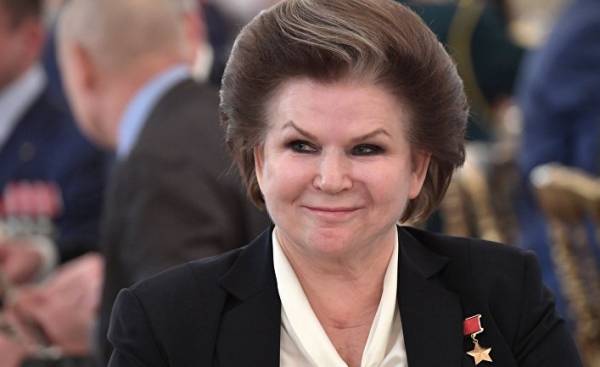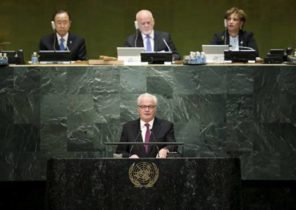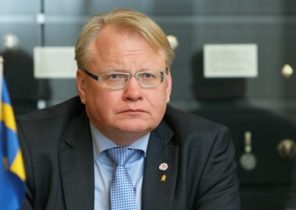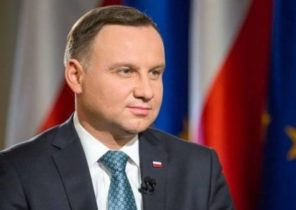
Skydiving was her first love. Right after she had the opportunity, Valentina Tereshkova became a member of the famous paramilitary flying club in his hometown of Yaroslavl (without saying anything to his mother) and started practicing every weekend. In total, she has performed 90 parachute jumps. “We did night jumps, jumps with a landing on land and water on the Volga”. She tells me that jumping day and night — “it’s a totally different experience, but they are always delicious.” She holds his hands out to the sides as if balancing in the air, and glows with happiness. “I learned to wait until the very last moment before tugging the ring, I wanted to feel the air. 40 seconds, 50 seconds… It’s not quite fall. You get great pleasure from the sensations experienced by your body. This is amazing”.
Hard to believe that the woman sitting next to me at the table and talk with such passion about his hobby, for 80 years. Yes, she turned 80 just a few days ago, and it is not even in meticulously arranged hair and makeup. It seems to me that it is not more than 70. I see her elegant hands with perfect dark manicure. Compared with its hands my own hands (although I’m younger) look wrinkled and rough.
We are somewhere in the bowels of the London science Museum, and Tereshkova was there so, as is usually done by famous people, that is accompanied by a small retinue. I have so often seen Tereshkova photos, films and even personally, from afar, it all seems totally familiar to her sitting perfectly suit, medal, red ribbon and a gold star, which indicated her status as a Hero of the Soviet Union — in those days it was the highest state award.
In that Tereshkova became famous, and now very hard to believe — like in her fascination with parachutes. More than 50 years ago, in 1963, Tereshkova became the first woman went into space, and her experience of skydiving helped her qualify. She was 26 years old when she made her first and only space flight, but this feat has determined the course of her future life. He helped her to get into the highest strata of the Soviet elite and secured her for life. However, for this upgrade it took so long to pay off: her shoulders lay a huge number of commitments she had to fulfill more than half a century.
Public speeches, accepting awards, traveling the world as a public diplomat, the need to remain a visible part of first the Soviet and then Russian public life — all these roles she plays to this day. With them connected and its arrival in London the exhibition devoted to her flight into space. This exhibition is one of the results of the joint Russian-British program, in which last year the Museum held an incredibly successful exhibition dedicated to Russian in space.
Did she enjoy the life she has lived largely in plain sight? “I think it is extremely important to meet people, make connections and tell people about space, she says seriously. — It helps to build trust, which we today are lacking”.
Tereshkova, which, of course, aware of the considerable cooling in international relations, considers himself (not for the first time) obliged to try to improve the situation through the tools of public diplomacy. Maybe she was surprised at how few people there are in the United Kingdom know her name. Over the years, global significance of its flight, and almost universal recognition gradually came to naught — but not for Russia and not for me because I am the man of the era.
The image of a strict and unsmiling Tereshkova — sometimes in uniform — are firmly entrenched in my memory and in the memory of many Russians. She always drew attention, as among the upper echelons of government who attended the official Soviet events has always been very few women. In the 1980s, when I worked as a correspondent in Moscow, I had often seen her at various political meetings that Mikhail Gorbachev was organized, embodying the ideas of perestroika and glasnost. Tereshkova later without much effort (at least so it seemed) moved into the ranks of the representatives of post-Soviet elite.
However, the most memorable shot was a fuzzy photo Tereshkova-cosmonaut. I’m old enough to remember the beginning of the “space race” in which America and the Soviet Union competed with each other for supremacy of the skies. There was a time when it was highlighted the difference between the astronauts (Americans) and astronauts (Russian), and the terms “space” and “space” existed side by side.
We knew about the Laika the dog, which in 1957 won the space race among the animals, representing the Soviet Union, and who soon died. Four years later Yuri Gagarin was ahead of American Alan Shepard (Alan Shepard), becoming the first man went into space. A year later, John Glenn (John Glenn) became the first American that entered the orbit of the Earth.
But in 1963, the pendulum has swung in the opposite direction, when Tereshkova brought another victory to the Soviet Union, becoming the first woman went into space. Although the most coveted prize went to the Americans, when in 1969 they landed on the moon. Even today, 40 years later, this victory is a bit disappointing for the Russians.
The memory of the rivalry in the space race helps shed light on the mysteries that have long surrounded the flight of Tereshkova. One of these was the assumption that, in many ways, that mission was a failure: there has been speculation that the first female astronaut was too weak and lethargic to carry out the planned experiments on Board, and that she was without sufficient grounds, refused to follow orders.
Only 30 years later, Tereshkova honestly tell how everything was actually. And she did me a favor by repeating it for me. She denies rumors that she was ill or more ill than you would expect — and that she was unable to conduct the planned experiments on Board. At her request, the mission duration has been increased from one to three days, and the planned experiments had to go only one day.
As for disobedience, then almost immediately after takeoff there was a pretty serious failure. According to her, she found that the parameters of the re-entry was incorrect — so incorrect that she could fly into space, instead of coming back to Earth. Eventually she is sent new data, but her superiors in the mission control center made her promise to keep the bug secret in order to protect reputation. “We insisted that everything was fine. We are not told about it. We have kept this secret for 30 years, until until died the man who committed the mistake.”
Tereshkova still remembers how the Earth looked like from space — “planet, which is simultaneously so beautiful and so vulnerable”. According to her, all “Americans, Asians, everyone who saw her said the same thing, saying how incredibly beautiful the Earth is and how important it is to protect. Our planet suffers from human activity, from fire, from war. We must preserve it”.
Did her flight into space? “When you get into space, you feel a longing for Earth as it is in its cradle. When you land, you want to kneel down and hug her.”
Tereshkova is very concerned about the danger posed by asteroids, and she pulls from her purse a fragment of a meteorite that fell to Earth. “He’s tiny,” she says, ” but it is very heavy.” She wants people to make greater efforts to prevent possible collisions. “People should not spend money on war, they need to get together and discuss how they can protect the world from threats such as asteroids coming from outer space”.
Like many astronauts and cosmonauts from around the world, Tereshkova nostalgic for the impressions which she received in space. Not losing hope that she will be able to make another space flight, she seriously said that they are ready to volunteer to fly to Mars at one end.
I ask her a question about the period of time when she was chosen to fly into space after long months of training and constant supervision. The only place on the spaceship “Vostok-6” was contested by five women. If she was surprised when she was chosen? If she was jealous of other contenders? No, she says almost with a sneer. “We knew that each of us deserves to be selected”. Supported communication with other contenders after the flight? (Rumor has it that Tereshkova is not so attentive to friends and family members, as it could be.) Surprised by the question, Tereshkova allows himself a small smile. Yes, she says, their group from time to time occurs, if not prevented illness and various commitments. “Between us there is a relationship, a partnership that will never disappear.”
Perhaps the first astronauts do there is a special bond, but with the increasing popularity of personal life Tereshkova, a host of problems. Her first marriage with cosmonaut Andrian Nikolayev was supported — and may have even been organized — the leadership of the space Agency, which saw in this marriage a perfect tale for the country’s population. At the ceremony of their marriage there was even the then leader Nikita Khrushchev. However, this part of the state has seriously complicated the situation when the relationship between spouses began to deteriorate. They officially divorced in 1982, Tereshkova married the surgeon Yulia Shaposhnikova, with whom they lived happily until his death in 1999.
Life Tereshkova is unique in the sense that she became the first woman went into space, but she was also a man of his time. For 80 years of her life in the history of Russia was a huge amount of events and turns. I will briefly list them in their conversation with her. Tereshkova was born in 1937, when Stalin’s purges reached their peak, which could not leave a mark. She picks up my hint, but no it does not respond.
After Khrushchev’s political thaw, there was a long period of stagnation under Leonid Brezhnev, followed by the tumultuous reforms of Gorbachev. Here Tereshkova interrupts me: “the Soviet Union was of great importance for several generations. I’m not going to ignore the errors, achievements and failures, but in General… to Portray everything only in dark colors would be a mistake. There were a lot of good.”
It has long been known argument in defense of the Soviet Union. For many Russians who survived the period of the collapse of the Soviet Union was a real betrayal. This is Valentina Tereshkova? Like Putin, she says “we all received the end of the Soviet Union as a personal tragedy, so we can’t forgive those who let this happen”. As it evaluates Gorbachev? Her response sounds very sharply, “I don’t respect him. I don’t even want to hear his name.” As it relates to Boris Yeltsin, who became the first President of the country after the collapse of the Soviet Union? “I didn’t know him. I know Vladimir Putin.”
Tereshkova lot of respect for Putin, and Putin, apparently, respects her. He personally congratulated her on her 70th birthday and 80th birthday and has increased its reserves of the state awards. “A lot depends on the leaders, she says. — Putin became the head of the country at the time when she was on the verge of collapse. He restored it and again gave us hope.” According to her, people trust it. “You see how it is taken, how people respond to it. He is a brilliant man.”
The impression that Tereshkova is still true to the habits developed in Soviet times. Responding this way about Putin and the Soviet Union, it expresses the opinion of ordinary Russians who happened to go through a lot of very disturbing change. They grew up in fear — if they realized it or not — or at least knowing the price of insubordination. They are happy with the stability that they associate with Putin — and this was partly attributed his success.
Could Tereshkova to do more — for example, to protect women’s rights or individual human rights in General — given its privileged position and status? Possible. However, their own example she proved that a woman can achieve many things, because she has made the greatest feat, going into space alone.
Speaking from the current position, we can say that its only achievement, which was followed by a life devoted to the service of his country, was proof of women’s potential and a reminder of the vulnerability of our planet. This in itself is a valuable contribution and greatest achievement.







